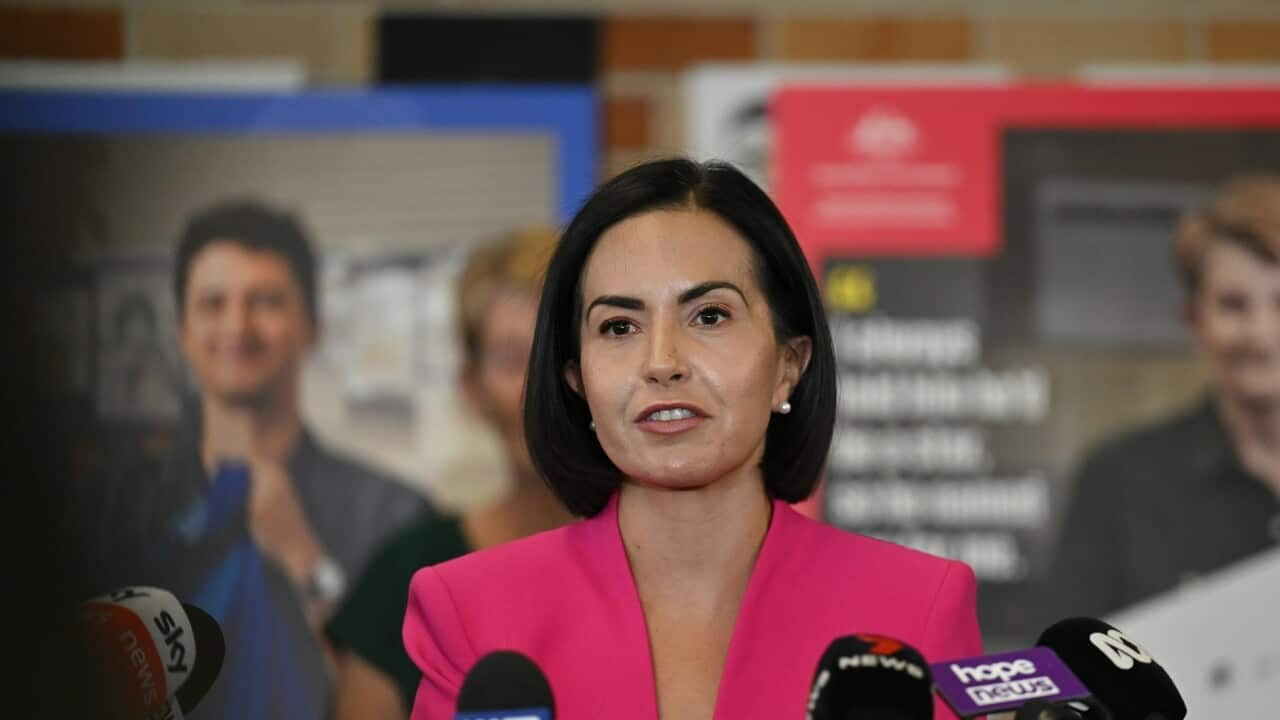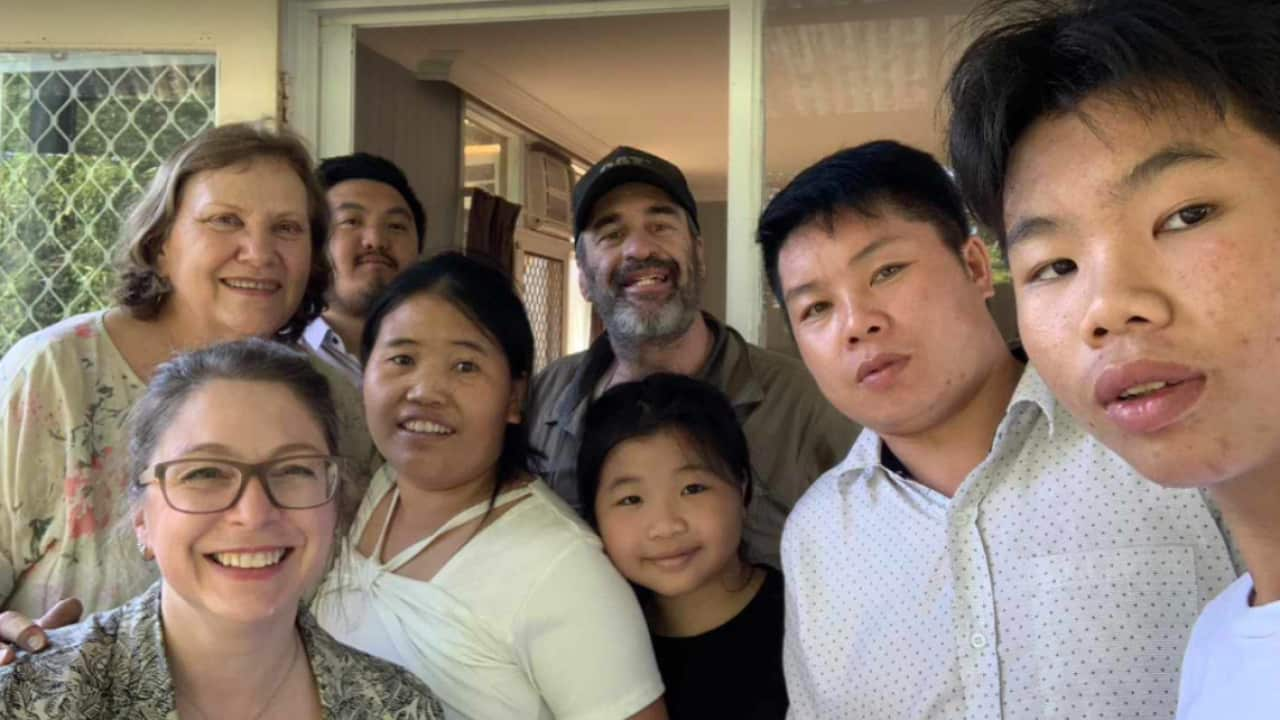Here is SBS Radio Hmong program and today we have a special guest, Mr Austin Virathone. So, in a situation that Australia is experiencing a national crisis or domestic violence of fabulous violence, how can we figure out if someone is experiencing a family violence?
Thank you for having me. This month is recognised as the Domestic Violence Awareness Month.
So, the statistics regarding family violence said that at least 28 women have died so far this year at the hands of men's violence. In 2022-23, that figure was around 17 women in terms of their deaths. Whereas in 2021-22 that was around 14, so it's seen a big rise in the number of deaths of women, especially at the hands of violence.
In terms of the warning signs per regarding family violence, it's quite subtle. It can be overt but predominantly the perpetrators do do it behind masked doors.
But in terms of the definition of family violence, it is quite broad. It's not just limited things to, such as like physical violence, it also extends to things such as sexual violence, property damage, economic violence, threats, threats to harm as well as coercive control. So, it's quite broad terms of the definition.Austin Virathone (Austin Vang)
Do you think that the government strategies to deal with domestic violence or family violence will work because Australia has been talking about this and news or social media platforms has been reporting. It seems like the issue doesn't go away easily. What should be done to tackle with this issue?
Look, it's a very complex issue, it’s a very gendered issue.
Multiple governments have tried to address this issue over the over the years. There's been a lot of discussion papers, a lot of reports done, but there hasn't been a lot of action on that front regarding addressing these issues.
Most recently the government of today has sought to establish a leaving violence programme. So that scheme delivers up to about ($)5000 in crisis support for women leaving violent relationships.
At this moment, there needs to be more detail about that scheme and the government may has sought to invest more money into the family violence space in the upcoming budget. But at this time, more detail needs to be released from the government about what that entails.
Do you think that there are enough contribution or ideas from the victim themselves, organisations or families’ units should be involved more in this, or having more say?
Look, I think they should have more say because they are the ones that are experiencing those issues and they should have a voice at the table in terms of any conversation regarding how to best support them going forward.
But obviously there's a lot of politics involved in this area and in any form of discussion, obviously the victim should have a voice at the table because it keeps happening every year. As I said, the statistics are increasing, and the number of women being murdered each year is increasing as well. So that is an issue going forward.
I'm an ex-lawyer. Currently what I do is I my family mediator. So, we commonly deal with separated parents that are dealing with children's issues and find some property. But it was to deal with a lot of clients are coming through family wells, so we provide them with a lot of referrals and support services going forward. Because we know that that people, especially women and children, are at greater risk of murders or family violence once they've decided to leave a relationship or when they are in the process of leaving a relationship or dealing with separation issues. So that's the most dangerous time for women and children.
READ MORE

Tej cwj pwm yuam lwm tus
What is the safest way to handle this situation from your perspective?
Look, every situation, every person and every family circumstances are very different and unique, so we really can't lump everyone into the same category.
Look, we see people that commonly come from different cultural backgrounds. So that that's an issue there as well, in terms of limited English, we commonly see people from low economic social backgrounds as well. So that's an issue as well.
You know that family violence is a big driver of homelessness as well. So, when people do leave violent relationships, they commonly don't know where to go or where to seek help.
So, there are services available there that we can refer them to. But in terms of leaving violent situations, obviously many people do not do that because of financial circumstances, so they have no choice but to remain living under the same roof with the perpetrator. But if they are not able to do that then it would be best if they leave that situation.
But obviously leaving that situation causes more issues as well, so it's best if they get in contact with any family violence services or contact the police. Or can you contact with any family of our specialist services going forward so that they can plan how to leave that situation safely and if they had children, how to do with their child safely as well going forward.
What do you think about the currents minister’s rhetoric that the perpetrator should be one who is getting out of the family, not the victim. What do you think of that?
Look, that's quite umh… in most cases that kind of difficult to do because the perpetrator as said earlier the way they use family violence is very subtle. It can be, say for example, having control over money. It can be something as simple as not allowing a victim to maintain a relationship with friends or family.
It's really about that perpetrator distorting a person sense of reality, making them feel helpless, making them feel like they can't leave the relationship, so they feel like they are very Co-dependent upon that perpetrator.
So, in response to that minister’s question, I guess that that sometimes can be difficult to do in reality. Because. If the perpetrator leaves the family home and the victim remains in the house with the children, then that create issues as well, because then the perpetrator can potentially come back to the family home unless locks are changed, unless there is a safety plan involved, unless there's an intervention order so he can create issues there. It is a difficult, it's difficult topic to grapple with.
Do you think that bail laws in Australia are working because New South Wales government just announced that they want to review their bail laws should Australia do so national wide?
Look it is not consistent across the country in terms of the laws regarding domestic violence, I know that in Queensland they've introduced laws around coercive control and other states are sort of looking into that as well as NSW.
But it would make sense if from a national perspective the laws are consistent across the country because we know that when victims are fleeing domestic violence situations, they often have no choice but either going to the rural country or relocate interstate other family members are.
So, the government is trying to make the data be more consistent across the board. They trying to make the information sharing a little bit easier across states.
But in saying that it's a very complicated issue, but we know that this year predominately the deaths of women predominately occur in Queensland and NSW with Victoria being the third place, whether that normally takes place. So those are the three major states with issues regarding domestic violence.
What can we do to deal with men with violent behaviour?
Look, typically if there are services in every state in country that that provide men’s behaviour change programs for men that are quitting family violence, that want to take steps to address these issues, especially if they are accountable for their actions, but if a perpetrator is not wanted to be accountable for their actions, then it's a bit hard to obviously change their behaviours.
But there are services, men's behaviour changes services, anger management services, there are parenting programmes that men can do to address these issues. It just simply whether that person wants to seek help and wants to change their behaviour.
What do you think about Hmong community in Australia? Do we have this issue as the national crisis issue as well? How can we deal with it?
Look, I think family domestic violence affects everyone in the community, not just in the Hmong community, the wider Australian community.
I have heard cases that are obviously of concern in the Hmong community, especially regarding domestic violence regarding murders things like that.
But I think the purpose of this month is to continue to raise awareness about domestic and family violence and its impacts, and to make sure and make people aware of how to access help and support if they are experiencing those things. But also, we also need to encourage people who use abuse and violence to take responsibility for their actions as well, and to seek support to change those behaviours if they want to do that.
But in terms of our community in terms of Hmong community itself, it is an issue. And I think we will certainly do more to address those issues as well.
Do you have any comments that we haven't mentioned in regard to domestic violence and how can we as a society, community or individual can contribute to prevent or stop these issues before it starts?
Look, the issue of domestic violence is a very complex. I think just speaking about it and being more transparent about the issue, making people aware of it and will help the community to understand that this issue is taken quite seriously in Australia.
In terms of help for people that are experiencing massive eyes, I would always encourage them to either speak with police if there is an issue.
I would also encourage people to obviously go and get some legal advice about your current circumstances if you are potentially leaving a dangerous relationship, and obviously you can consult legal aid or you can go to a community legal centre just to seek advice about what are your options available there going forward and they can point you in the right direction there.
Support Services for Victims of Domestic Violence:
1800 Respect National Helpline: 1800 737 732
Women’s Crisis Line: 1800 811 811
Safe Steps: 1800 015 188
Orange Door
InTouch Multicultural Centre: 1800 755 988
Mens Referral Service: 1300 766 491
Lifeline (24 hour crisis line): 131 114
Relationship Australia: 1300 364 277
NOTE:
This interview with Austin Virathone is for general education only, should you need help registered legal professional is recommended.
Listen Thursday 6 pm and on Sunday 11 am, or follow us at , , and . Downloadand follow us on












